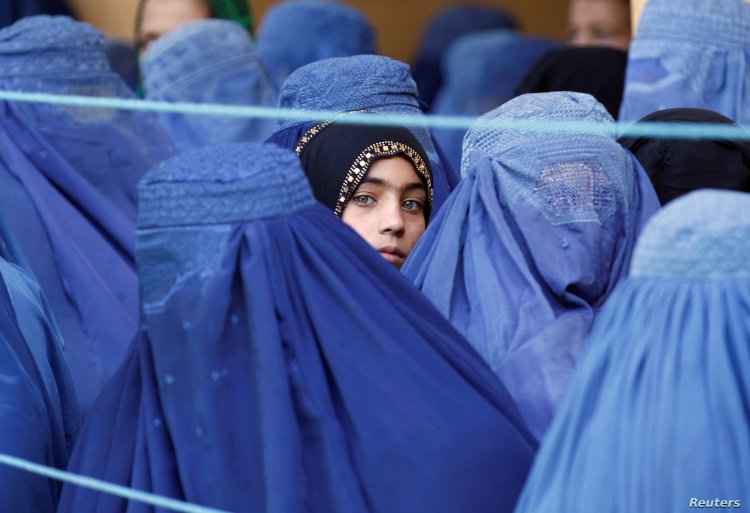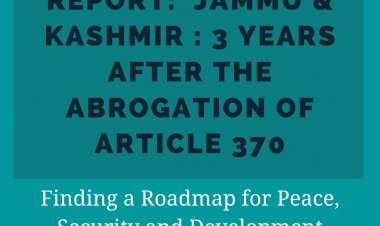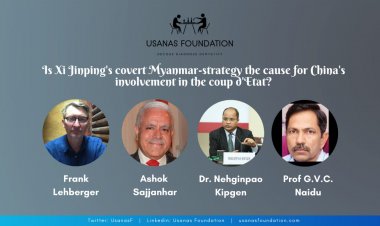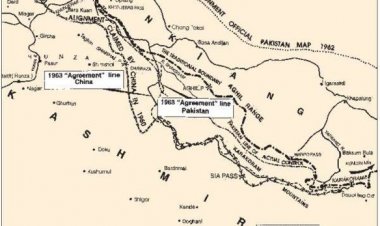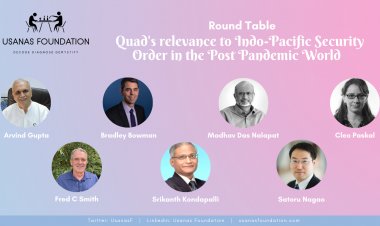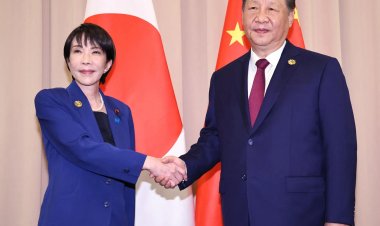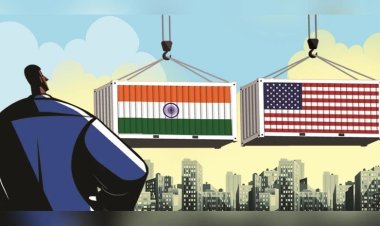Webinar Report
By Usanas Foundation
The speakers for the webinar were Dr Bilquees Daud, a lecturer at the Jindal School of International Affairs, author of 'Education for Peace: Rehabilitating Non-Violent Discourses in Afghanistan', Ms Nandita Mishra, IES, Economic advisor for Government of India, Mr Rafi Sherzad, Project Manager in World Bank and assistant professor in Kardan University and Dr Manjari Singh, Associate Fellow in Centre for Land Warfare Studies (CLAWS). The webinar was moderated by Mr Abhinav Pandya, CEO of Usanas Foundation.
Dr Bilquees Daud pointed out that gender security was an important issue in peace deal negotiations. The first peace deal that was signed mentioned nothing regarding women's rights. From the Taliban side, there was no woman representative. In the districts that are controlled by the Taliban, the women are not encouraged to have a modern outlook. In those districts, Taliban restricted girls' education till Sixth grade and boys' education till twelfth grade. The school curriculum was changed to suit the religious, ideological framework of the Islamic fundamentalists. Dr Bilquees Daud divided her lecture into three parts. First, she briefed on the concept of gender security holistically, second the case of Afghanistan, and finally, how India can play a crucial role.
How can the state protect its citizens?
The conventional understanding of security, as we know, is state security. However, the comprehensive understanding of state security nowadays includes gender security and gender inclusiveness. It includes all forms of violence: domestic violence, rape, poverty, and gender subordination. Gender policies have become more gender-sensitive. The popular narrative is that war protects the vulnerable people of the society. However, in war, women and children make up 90% of the casualties. Women are affected by the war differently and are the central humanitarian support system in war and its aftermath. They provide support, raise children, and heal the wounded. Therefore, when we talk about gender security, we need to ensure the gender policies are more gender-sensitive. They should also provide economic protection to women. Women in most societies are disproportionately located at the bottom of society. They are paid less than men, which makes women economically vulnerable. This economic disparity in income distribution must be addressed.
In the case of Afghanistan, since 2001, the United States intervention, a lot has been achieved. Education, health and political participation have improved. World Bank statistics reflect that the maternal mortality rate decreased from 1450 to 100 births in 2000 to 638 to 100 in 2007. In the education sector, UNICEF report reveals that the number of children in schools has increased from One million in 2001 to 8.5 million in 2009, of which 38% were girls. Despite these improvements, the country still faces widespread sexual violence against girls, abduction, rape. The women's rights advocates are being attacked and face opposition. The gender security index ranks Afghanistan as 167th. Afghanistan's rank is low due to organized crime and gender security.
How can India play a crucial role?
The international and domestic promotion of gender security policies were very wistful and were not sensitive to the cultural norms of Afghanistan. India's position is unique. India is in the same region, has negotiated and also suffered similar gender-related issues. Afghanistan can learn from India's experience and seek India's help in policymaking. The current policies of women empowerment through financial inclusion in India can be studied and applied to Afghan society.
The women in Afghanistan are usually housewives and are vulnerable to exploitation, much like Indian women on an average. The government of India provides loans to women entrepreneurs to set up a small business. The financial schemes like Annapoorna Scheme and Mudras Scheme provide loans to women entrepreneurs of small and medium scale. The state of Tamil Nadu and Madya Pradesh has provided bicycles to girls to encourage them to attend schools. Many states have mid-day meals and free laptop schemes for High school students to support and encourage them from going to school. These schemes can be adopted in Afghanistan and can be customized to suit Afghan society. The implementation also requires creating awareness and educating the support group and giving them incentives.
Ms Nandita Mishra spoke about women's general status in Afghanistan, the concept of security, how gender security concepts emerged, and how India's partnership with Afghanistan will empower women of Afghanistan. 80% of Afghans live in rural areas, and women make one half of the Afghan population. In the 2019 gender development index, Afghanistan ranks 143 out of 162. In 2019 Afghanistan ranked bottom twenty in the human development index. Ms Mishra spoke about her tenure in Afghanistan. She said the number of disabled is very high, and the burden of looking after them is upon women. Throughout Afghan history, there have been several attempts to improve women's security and general condition. In 1920, the Afghan ruler Amanullah Khan launched a scheme to make education compulsory for both boys and girls by opening schools and opening exchange programs abroad. He even challenged forced marriage and polygamy. The reforms were not well received and were seen as a challenge to Islamic law. Understanding the people are and how they live helps us to improve women's security. Due to the ethnoreligious diversity and differing views about women affect women's participation in society and development.
Security is the absence of a threat. Security holds state as the primary actor; however, security has different areas other than traditional security. For the past decade, the approach has been individualistic. The human security concept was first introduced in the United Nations Development programme's Human Development Report in 1944. The emphasis shifted from territorial security to people. The report introduced seven major categories of human security. Economic security, Food security, Health security, Environment security, Personal security, Community security, and Political security. Gender security has two prongs. To protect and to empower women. Human security and gender have a very close-knit relationship. The concept of security is not static. It is dynamic and keeps on changing.
How can India-Afghanistan cooperation empower women of Afghanistan?
India and Afghanistan have been ancient neighbours dating back to the Golden era of Buddhism in the sub-continent. The socio-political engagement has been complimenting each other's aspirations, apart from inter-state relationships, NGOs have actively participated in welfare, reconstruction and reformation of post-war Afghanistan. India has provided Two billion USD to Afghanistan since 2001. India has continuously supported and promoted women's participation in the entrepreneurial and professional world. The SEVA NGO helps Afghan women become self-reliant. They were provided training in sewing and other production line work. They now produce uniforms for the Afghan army. The open discourses on women empowerment and NGOs encouraged Afghan women to become entrepreneurs. Few other successful Government of India sponsored scheme is Afghan India Vocational training centre at Kabul, which aims at infrastructure development throughout the country, construction of public libraries, training and vocational education in border areas; Indira Gandhi Children's Hospital; Parliament of Afghanistan (National Assembly), which was constructed and inaugurated by India and many others. These developments have an inherent philosophy to build a functional democracy which could address gender issues.
Dr Manjari Singh focused on children and women being the most vulnerable sections of the society in a conflict-ridden region. It is also believed in radicalization discourse that women play a crucial role in radicalizing youth, especially mothers. He emphasized that an empowered and educated woman plays a more significant role in the de-radicalization of youth. Two parallel changes have happened in the world. First is a drive to achieve sustainable development goals, and second is the shift from unipolar to multipolar world order. India is seen as an emerging regional power. Therefore, India's leadership in south-south cooperation is essential.
How do you empower our women?
The key to gender security is women empowerment which can be achieved through economic participation and opportunity, educational attainment, health and survival, and political participation. India can play a crucial role in the first three.
India's primary focus has been on economic participation and opportunity. In political arenas, women were provided 27% of the seats in the House of People. One-Sixth of the seats in the Upper House was reserved for the women. Similarly, 20% of the seats in the provincial council were reserved for women. Now when we talk about the Afghanistan Action Plan and implementing the security council resolution 1325 on women's peace and security. What we found is that now Two million girls started attending schools. Through the constitutional framework, India has implemented several policies to reduce gender inequality and women, and child welfare occupy a sizeable portion of the annual central budget, which also includes provisions to improve economic conditions and opportunities for women.
The data that is available about gender-related issues and gender security is limited. Afghanistan is not mentioned in the gender gap report published by the World Economic Forum. The reason being the lack of adequate data. India is involved in bringing UN reporters to Afghanistan to conduct a survey and collect data. India can be an intermediate between UN bodies and Afghanistan, helping Afghans obtain necessary data to work on policies.
Mr Rafi Sherzad stated that the ministry of women's affairs is more of a policy than a ministry. My recommendation to India is to work with Afghanistan to make it a more pragmatic ministry than a policymaking ministry. Women run the economics ministry, education ministry, and information ministry. Women run the embassies; for example, the Afghan ambassador to the United States is a woman. The UN permanent ambassador from Afghanistan is a woman. In terms of economic empowerment, Afghanistan has a dedicated chamber ACCI(Afghanistan Chamber of Commerce and Investment). Afghanistan is also very diverse. There are 34 provinces, and for example, in the province of Nuristan, men do the housework and women do the fieldwork. They are culturally different and open for adaption.
Is the Afghan government doing enough to empower women?
Yes, but there are areas where it could do better. The problem arises due to the majority of the population living in rural areas. Government has difficulty reaching them. Women's National Economic Empowerment Program, WNEEP, is a guideline for the NGOs and other actors to follow women empowerment initiatives and guidelines. If India aims to empower women in Afghanistan, WNEEP is the right platform, to begin with.
The challenges in Afghanistan are immense. Afghanistan is at the bottom of the human development index. Sustainable and moderate levels of participation are missing in major cities and rural areas. Women are not welcomed to lead any community. Sometimes they are appointed as symbolic heads. We need to change that there is silent non-participant of a vital part of the society. Their voice is wholly silenced and is used as assets, tools and commodities. This is because of the perception of men's role in society should change first. If there is animosity between families, women are exchanged to broker peace between families, like commodities, as a sign of goodwill. Early marriage and honour killings are still prevalent, and it is because of the societal makeup of 'men'. The speaker called for other countries not to impose their countries' norms and traditions upon Afghan culture. He alluded to proud Afghan history of dating thousands of years. Although certain traditions might be wrong, we should work within the traditional framework to weed out the bad and bring in the good instead of imposing a foreign system upon Afghanistan, which might not sustain longer. He warned of the consequences of change alluding to 1981 Russians ideological imposition on Afghanistan.
The speaker also added that Afghanistan is not confined to Kabul; it has 34 provinces. Most development programs are focused on and implementations in and around Kabul. The lack of attention to other provinces can hinder the overall development of society.
The presentations by individual speakers were followed by a question-answer session.
Mr Mrityunjai Dubey asks, In what role does Afghanistan see India as a crucial partner in raising the human resource potential of Afghanistan through India's ITEC programme focusing on gender perspectives?
Answer: Dr. Bilquees Daud: India as a developmental partner should work towards providing economic security of women in Afghanistan because in India there are many examples of poor women in rural areas becoming more economically independent through loans provided by the government and starting a business of their own. India should also focus on building more educational institutes in Afghanistan and giving more opportunities in the educational sector to Afghans which in reality, India is already doing. A lot of afghan students come to study in India through scholarships. The Indian civil society also has a very important role to play because civil society organisations in India have been fairly successful and are an inspiration for Afghanistan. Lastly, India can give specialised IT training to Afghan women and thereafter, they can work in conventional and sub-conventional job opportunities.
Mr. Rafi Sherzad: When it comes to IT, India is the best in the sector providing expertise not just in the region but even to developed nations like the US. In Afghanistan, there is a robotics team who recently created ventilators for Covid-19 patients. This kind of initiative can be supported by countries like India. IT hubs can be created in Kabul where Afghans come to learn and share knowledge which in return can be connected to India's IT hub city like Bangalore. All of these developments are investments in human resources and therefore, sustainable.
Mr. Abhinav Pandya asks Ms Nandita Mishra about the Indian perspectives on developmental projects in Afghanistan
Answer: Ms Nandita Mishra: India sends its civil servants as part of a capacity-building project to neighbouring countries such as Afghanistan. There was close coordination among the 30 civil servants who were posted in different ministries. India doesn't believe in interfering in the social and cultural setup of a country. We try to adapt the track-2 diplomacy where we do not do anything only for women particularly but where women also benefit like infrastructure development, educational facilities. They are not just for women but for both the sexes benefit. Only when the ministry of finance intervenes only then things like gender-responsive budgeting can be successful so it's the ministry of finance which plays an important role than the ministry of women empowerment.
Mr Abhinav Pandya asks Dr Manjari Singh, What is the likely future of Afghanistan after the US withdrawal and the subsequent coming of Taliban to power?
Answer: Dr. Manjari Singh: Due to India's non-interventionist policy towards Afghanistan, it has given us a genuine advantage on developmental issues in Afghanistan and winning the hearts and minds of the local population. So in the scenario of Taliban coming to power, India should talk to the Taliban and let them know about the genuine efforts that we have made. India should invest on MSME's because if that generates income then some way or the other, Taliban will also benefit and this will make them weary of concerns.
Mr Rafi Sherzad added on about the impact of Taliban on gender security if it comes to power. There is no information on the content of the negotiation that is going on between the Taliban and the Afghan government so nothing much can be said but there are speculations that the Taliban of 2021 will not be the same like the 90s, their way of governance will be different and I wish the same that the negotiation will be reached between the government and the Taliban.
Mr Abhinav Pandya further asks Ms Bilquees Daud and Mr Rafi Sherzad on the “Pashtunwali Code” of society in Afghanistan and what were the social structures which lead to the empowerment of women?
Answer: Mr Rafi Sherzad: There are books and movies on both the general Afghan conduct and the “Pashtunwali code”. There are some commandments in Afghanistan which are generally respected and people have to abide by them and this dates back to history. For instance, one code says that if someone seeks refuge in your home, you have to protect them even if he or she is your enemy. Another code says that in a conflict, you must protect the children and the woman. Most of these codes were followed in the rural areas rather than the urban areas but they were not perfect and therefore need change, but behavioural change is something that needs time and cannot be done overnight. A lot of projects have been done in the rural areas of Afghanistan which focus on community development and particular emphasis on protecting women and children. But most of these values are now on the verge of collapse due to the war. In the past, the society in Afghanistan was value-centric rather than being materialistic but this changed after the conflict. So in the present situation, with the coming of capitalism, the focus is more on materialism rather than the values.
Dr Bilquees Daud: There is also a political aspect of Pushtunwali and there has been this popular discourse that the Taliban represents the traditional village values of Afghanistan but it is not true because the Taliban has never lived in Afghan villages and they are the product of the Madrasas in Pakistan. Many people think that the Taliban is Pashtun and therefore represents the Pashtunwali code but if we look at the kind of punishments they inflicted, they would have been unimaginable in reality, when practised with the Pashtunwali code. The village life in Afghanistan was very different before the arrival of the Mujahideen and the Taliban. The first thing that the Taliban did after taking control of power was that they either killed or replaced the village leaders with Mullahs. They forced people to follow Sharia Law instead of Pashtunwali.
Closing remarks :
Afghanistan cherishes its long history with India. It's time to learn from each other's experiences of shared history. Financial inclusion programs and NGOs can empower Afghan women. The media sector equally remains weak in Afghanistan. India's freedom of the press and Bollywood can serve as a benchmark for freedom of the press and entertainment modernizing the society. French and Turkish governments have opened up a chain of schools to educate Afghani youth. India can also start similar institutions to develop and educate youth. The last thing is that if India can provide preferential treatment to women lead businesses, it would immensely empower women. India already helps afghani traders with tariffs relaxations and other opportunities.
Disclaimer: The opinions expressed in the webinar belong to the panellists and not necessarily to the Usanas Foundation.
